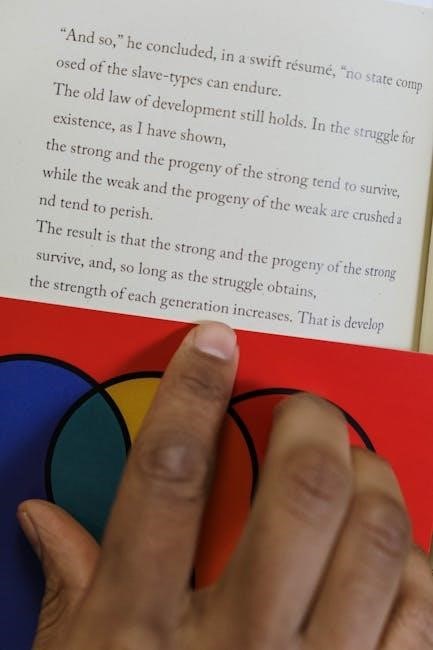Reading Comprehension for Year 7 Students
Reading comprehension is a crucial skill for Year 7 students, enabling them to understand, interpret, and analyze texts effectively. It involves critical thinking and vocabulary expansion, with various resources like PDF materials, guided exercises, and interactive tools available to support their learning journey.
Reading comprehension is a fundamental skill that plays a vital role in academic success, particularly for Year 7 students. It involves the ability to understand, interpret, and engage with written texts effectively. Developing strong comprehension skills at this stage helps students build a solid foundation for future learning. Year 7 is a transitional period where students are introduced to more complex texts, making it essential to refine their reading strategies. PDF materials and interactive resources are widely recommended to support practice and improvement. These tools often include guided exercises, passages, and questions designed to enhance understanding and critical thinking. Additionally, discussions and active reading techniques are emphasized to foster deeper engagement with texts. By mastering reading comprehension, Year 7 students can confidently tackle a variety of genres and topics, preparing them for higher-level studies.

Understanding Reading Comprehension
Reading comprehension is the ability to understand, interpret, and analyze written texts effectively. It involves vocabulary knowledge, critical thinking, and the ability to engage with the material to extract meaning and insights.
What is Reading Comprehension?
Reading comprehension is the ability to read, understand, and interpret written texts effectively. It involves critical thinking, vocabulary knowledge, and the capacity to engage with the material to extract meaning. This skill allows Year 7 students to process information, identify main ideas, and make connections between concepts. Effective comprehension requires active engagement with the text, including asking questions, making inferences, and summarizing key points. It is a foundational skill that supports academic success and lifelong learning. For Year 7 students, mastering comprehension involves practicing with diverse texts, such as PDF materials, and using strategies like highlighting, note-taking, and discussion to deepen understanding. Developing this skill helps students not only in school but also in real-life situations where interpreting information is essential. Regular practice and exposure to various reading resources can significantly enhance their ability to comprehend complex texts.
The Importance of Reading Comprehension in Year 7
Reading comprehension is essential for Year 7 students as it forms the foundation for academic success across all subjects. It enhances their ability to interpret and analyze complex texts, fostering critical thinking and vocabulary expansion. Strong comprehension skills enable students to engage meaningfully with materials in subjects like English, history, and science, ensuring they grasp key concepts and ideas. Additionally, it equips them with the ability to infer and draw conclusions, which are vital for problem-solving and higher-order thinking. Year 7 is a critical phase where students transition to more advanced learning, making comprehension a cornerstone of their educational development. By mastering this skill, students can access a wider range of texts, including PDF materials and literary works, and apply their understanding in both academic and real-world contexts. Thus, prioritizing reading comprehension in Year 7 sets students up for long-term academic and personal growth.
Key Components of Reading Comprehension
Reading comprehension consists of several core components that work together to enable effective understanding of texts. These include vocabulary knowledge, which is the ability to understand word meanings, and fluency, the capacity to read texts smoothly and accurately. Another critical component is comprehension strategies, such as summarizing, questioning, and visualizing, which help students engage actively with the material. Additionally, critical thinking plays a vital role, as it involves analyzing, interpreting, and making connections between ideas within the text. Finally, metacognition is essential, as it allows students to monitor their understanding and adjust their strategies as needed. Together, these components help Year 7 students build a strong foundation for interpreting and responding to a variety of texts, including PDF materials and literary works, ensuring they can apply their skills across subjects and in real-world situations.

Improving Reading Comprehension Skills
Improving reading comprehension involves setting clear goals, practicing regularly, and seeking feedback. Consistent practice with diverse texts and active engagement strategies enhance understanding and retention, fostering lifelong learning skills for Year 7 students.
Setting Goals for Better Comprehension
Setting clear and achievable goals is essential for improving reading comprehension. Year 7 students should aim to understand the main ideas, identify key details, and make connections between texts. Breaking down goals into smaller tasks, such as increasing reading speed or expanding vocabulary, helps build confidence. Teachers and parents can assist by creating personalized goals aligned with the student’s reading level. Regular progress checks ensure that goals are met and adjusted as needed. By setting specific objectives, students develop a focused approach to reading, leading to better comprehension and a stronger foundation for future academic success.
The Role of Practice in Enhancing Skills
Regular practice is vital for improving reading comprehension skills in Year 7 students. Consistent engagement with diverse texts helps students develop familiarity with different writing styles and content. Activities such as Think Aloud exercises, where students verbalize their thought process while reading, enhance their ability to identify main ideas and supporting details. Additionally, timed reading sessions can improve reading speed without compromising understanding. Incorporating graphic organizers and comprehension worksheets further reinforces critical thinking and retention of information. The more students practice, the more comfortable they become with analyzing complex texts, making connections, and drawing conclusions. Practice also builds confidence, encouraging students to tackle challenging materials independently. Over time, consistent effort leads to significant improvements in comprehension and overall academic performance.
Seeking Feedback and Assessment
Seeking feedback and assessment is essential for monitoring progress in reading comprehension. Regular quizzes, class discussions, and written exercises provide opportunities for students to demonstrate their understanding. Teachers often use question types that require students to make inferences and support their answers with evidence from the text. Digital tools and apps can offer immediate feedback, helping students identify areas for improvement. Peer discussions and group activities also foster collaborative learning, allowing students to share insights and learn from one another. Additionally, graphic organizers and comprehension worksheets can be assessed to track progress over time. Feedback from teachers and peers helps students refine their skills, such as identifying main ideas, making connections, and drawing conclusions. Regular assessment not only builds confidence but also encourages students to engage more deeply with the material, leading to improved comprehension and critical thinking abilities. Consistent evaluation ensures students stay on track and continue to grow as readers.

Effective Strategies for Comprehension
Effective strategies for comprehension include active reading, vocabulary building, and summarizing. These methods help Year 7 students engage deeply with texts, improving understanding and retention of material.
Active Reading Techniques
Active reading techniques are essential for improving comprehension. These include underlining key points, making margin notes, and asking questions while reading. Students can also use the Think Aloud method to verbalize their thoughts, helping to clarify confusing passages. Another effective strategy is to identify the main idea and supporting details in each paragraph. Teachers often encourage students to preview the text before reading to understand its structure and purpose. Additionally, self-questioning techniques, such as summarizing sections or predicting outcomes, can deepen understanding. These methods require engagement and focus, making reading a more interactive and meaningful process. By incorporating these techniques, Year 7 students can develop a more robust approach to reading comprehension, leading to better academic performance and a lifelong love of learning. Regular practice and guidance from educators are key to mastering these skills effectively.
Building Vocabulary for Better Understanding
Expanding vocabulary is a cornerstone of improving reading comprehension for Year 7 students. Understanding unfamiliar words is crucial for grasping the meaning of texts. Techniques such as using context clues, dictionary definitions, and repeated exposure to new words can significantly enhance vocabulary. Students can benefit from flashcards and word journals to track and review new terms. Additionally, discussing word origins and prefixes/suffixes can provide deeper insights. Teachers often incorporate vocabulary-building exercises into daily routines, ensuring students are well-prepared for complex texts. A strong vocabulary not only aids in comprehension but also improves writing and communication skills. Regular practice and exposure to a variety of texts can foster a lifelong appreciation for language. By focusing on vocabulary growth, students can unlock the full potential of their reading abilities, leading to greater academic success and confidence in their learning journey.
Summarizing and Retelling Strategies
Summarizing and retelling are essential skills for Year 7 students to enhance their reading comprehension. These strategies help students identify main ideas, supporting details, and the overall structure of a text. When summarizing, students should focus on condensing information into concise statements, highlighting key points without unnecessary details. Retelling involves recounting the text in their own words, ensuring understanding and retention of the content.
Effective techniques include identifying the main idea, recognizing cause-effect relationships, and using graphic organizers to visually map out the text. Teachers often encourage students to write summaries after reading or to discuss the text in small groups. Regular practice with these strategies improves students’ ability to process and communicate information effectively, fostering better comprehension and critical thinking skills. By mastering summarizing and retelling, Year 7 students can approach complex texts with confidence and clarity.
Inferring and Drawing Conclusions
Inferring and drawing conclusions are advanced reading comprehension skills that enable Year 7 students to go beyond the literal meaning of a text. Inference involves using clues from the text and prior knowledge to make logical interpretations. For example, if a character is described as smiling frequently, a student might infer that the character is happy or friendly.
Drawing conclusions requires students to synthesize information from the text to form a broader understanding. This skill is particularly useful for answering “why” or “how” questions. Effective strategies include identifying textual evidence, making connections to personal experiences, and practicing with open-ended questions. Teachers often use “Think Aloud” techniques to model how to approach inferential questions. Regular practice with guided exercises and discussions helps students build confidence in their ability to make accurate and supported conclusions. By mastering these skills, Year 7 students can deepen their understanding of complex texts and prepare for higher-level reading challenges.

Recommended Resources for Year 7
Year 7 students can benefit from PDF materials, interactive exercises, and graphic organizers to enhance reading comprehension. Online tools like the College Board and reading apps provide structured practice and engaging activities for skill development.
Best PDF Materials for Practice
PDF materials are an excellent resource for Year 7 students to improve reading comprehension. They often include structured exercises, passages, and questions tailored to their skill level. Many PDFs provide comprehension tests, vocabulary exercises, and answer keys for self-assessment. These materials cover a variety of topics, ensuring diverse exposure to different writing styles and genres. Some PDFs also incorporate visual aids and graphic organizers to enhance understanding. They are designed to be user-friendly, allowing students to practice independently or in a classroom setting. Regular use of these resources helps build confidence and fluency in reading. Additionally, PDF materials are easily accessible and can be downloaded from educational websites, making them a convenient option for home study. By utilizing these tools, Year 7 students can systematically improve their comprehension skills and prepare for academic success.
Interactive Exercises and Worksheets
Interactive exercises and worksheets are dynamic tools designed to enhance Year 7 students’ reading comprehension skills. These resources often include engaging activities such as multiple-choice questions, fill-in-the-blank exercises, and short-answer prompts. They are tailored to specific comprehension strategies, helping students practice skills like identifying main ideas, making inferences, and understanding vocabulary in context. Many worksheets incorporate multimedia elements, such as images, charts, or audio clips, to cater to different learning styles. Additionally, interactive exercises provide real-time feedback, allowing students to track their progress and identify areas for improvement. These resources are versatile, suitable for both classroom use and independent study at home. By combining structured practice with engaging content, interactive exercises and worksheets make learning enjoyable and effective, helping Year 7 students build a strong foundation in reading comprehension.
Using Graphic Organizers Effectively
Graphic organizers are powerful tools that help Year 7 students visually structure and organize information, enhancing their reading comprehension. These diagrams, such as Venn diagrams, concept maps, and flowcharts, enable students to identify main ideas, supporting details, and relationships within texts. By breaking down complex information into a clear, visual format, graphic organizers make it easier for students to analyze and retain what they read. Teachers often use these tools during lessons to guide students in identifying themes, characters, and plot structures. Additionally, graphic organizers can be adapted for different learning needs, making them inclusive and effective for all students. They also encourage active engagement with the material, helping students develop critical thinking and comprehension skills. Regular use of graphic organizers can significantly improve a student’s ability to process and understand various types of texts, making them a valuable resource for Year 7 reading comprehension.
Online Tools and Apps for Comprehension
Online tools and apps have become essential resources for improving reading comprehension among Year 7 students. Platforms like ReadTheory, Reading Bear, and Khan Academy offer interactive exercises tailored to enhance understanding and retention. These tools often feature leveled texts, quizzes, and progress tracking, allowing students to practice at their own pace. Many apps incorporate gamification elements, such as badges and rewards, to motivate students and make learning engaging. Additionally, tools like Quizlet and Edmentum provide structured activities to build vocabulary and comprehension skills. These resources are particularly useful for reinforcing classroom lessons and catering to diverse learning styles. Teachers can also use these platforms to assign homework and monitor student progress. By leveraging technology, students can access a wealth of materials anytime, anywhere, making online tools a valuable addition to their reading comprehension journey.
Mastering reading comprehension is a vital skill for Year 7 students, laying the foundation for academic success. By understanding the importance of comprehension, students can unlock the ability to interpret and analyze texts effectively. Setting clear goals, practicing regularly, and seeking feedback are essential steps to improve. Utilizing resources such as PDF materials, interactive exercises, and online tools can further enhance learning. Educators play a crucial role in providing guidance and support, helping students develop strategies like active reading and vocabulary building. Consistent effort and engagement with these tools will empower students to become confident and proficient readers. Encouraging a love for reading and fostering a growth mindset will ensure long-term success in comprehension and beyond.